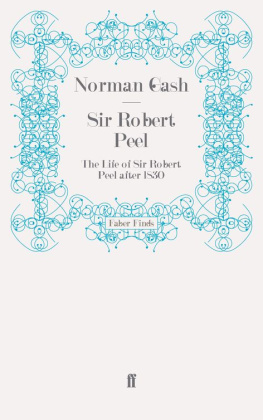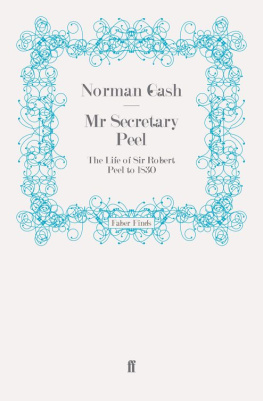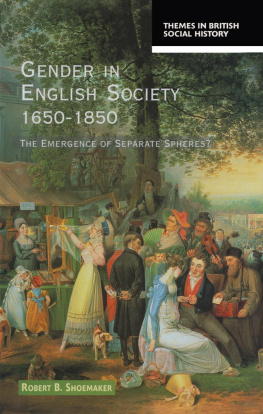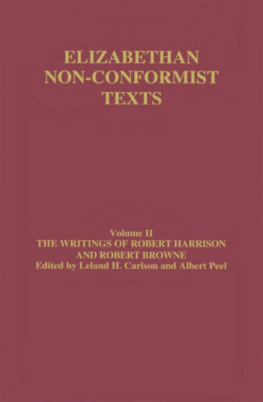Norman Gash - Sir Robert Peel: 1830-1850
Here you can read online Norman Gash - Sir Robert Peel: 1830-1850 full text of the book (entire story) in english for free. Download pdf and epub, get meaning, cover and reviews about this ebook. year: 2011, publisher: Faber & Faber, genre: Detective and thriller. Description of the work, (preface) as well as reviews are available. Best literature library LitArk.com created for fans of good reading and offers a wide selection of genres:
Romance novel
Science fiction
Adventure
Detective
Science
History
Home and family
Prose
Art
Politics
Computer
Non-fiction
Religion
Business
Children
Humor
Choose a favorite category and find really read worthwhile books. Enjoy immersion in the world of imagination, feel the emotions of the characters or learn something new for yourself, make an fascinating discovery.
- Book:Sir Robert Peel: 1830-1850
- Author:
- Publisher:Faber & Faber
- Genre:
- Year:2011
- Rating:5 / 5
- Favourites:Add to favourites
- Your mark:
- 100
- 1
- 2
- 3
- 4
- 5
Sir Robert Peel: 1830-1850: summary, description and annotation
We offer to read an annotation, description, summary or preface (depends on what the author of the book "Sir Robert Peel: 1830-1850" wrote himself). If you haven't found the necessary information about the book — write in the comments, we will try to find it.
Sir Robert Peel: 1830-1850 — read online for free the complete book (whole text) full work
Below is the text of the book, divided by pages. System saving the place of the last page read, allows you to conveniently read the book "Sir Robert Peel: 1830-1850" online for free, without having to search again every time where you left off. Put a bookmark, and you can go to the page where you finished reading at any time.
Font size:
Interval:
Bookmark:
I wish to express my humble thanks for the gracious permission of Her Majesty The Queen to use material in the Royal Archives. I am also greatly indebted to the following for their courtesy in allowing me to read and quote from papers in their possession or of which they hold the copyright: His Grace the Duke of Wellington, the late Earl Stanhope, the Rt. Hon. the Earl of Clarendon, Lord Brabourne, Sir Fergus Graham, Bt., the late Sir William Dugdale, Maj. Gen. E. H. Goulburn, George F. Peel esq., Robert Bright esq., and the Trustees of the Newcastle Estate.
Other personal acknowledgements will be found in the footnotes, but this is the only place where I can record my gratitude for the assistance I have received from Dr. George Kitson Clark, Professor W. O. Aydelotte, Dr. F. A. Dreyer, Mr. Aubrey Newman, Mr. Francis Needham, Mr. Robert Mackworth-Young and the staff of the Archives Department at Windsor Castle, Miss W. D. Coates and the staff of the National Register of Archives, the staff of the University Library of St. Andrews, and from my old friend Dr. A. J. Taylor. It is proper also for me to mention my obligation to the University Court of St. Andrews for their travel and research grants which make the business of writing history in a northern university less difficult than might be supposed.
N ORMAN G ASH
St.SalvatorsCollege
St.Andrews
March1971
The publishers are indebted to John Murray (Publishers) Limited for permission to use copyright material from ThePrivateLettersofSirJohnPeel edited by G. Peel.
As in the first volume of this new edition of the life of Sir Robert Peel, I have amended a few misprints and stylistic defects and added a bibliographical note on subsequent publications. I have also taken the opportunity in Part II of this Foreword to give a brief sketch of the later Peel family in order to round off the account in the text which halts in 1850.
A feature of the new bibliographical material is the number of books and articles on the Conservative Party in the first twenty years of its existence. This is clearly useful for the biography of a politician of whom it could be said (with a certain amount of compression ) that his career after 1832 consisted of leading the party in opposition, splitting it when in office, and repudiating it thereafter. As a historian, however, one may regret that the same amount of attention has not been given to the rival party. The process of bringing together Whigs, Liberals and radicals in one coherent organisation is just as important a field for investigation as the parallel movement among Conservatives. Indeed, a comparison of the two might well illuminate both. In this pioneer phase of party evolution the problems were similar. The position of the leader, responsibility for policy, tactics in opposition, maintenance of discipline, the permissible latitudes of dissent, the role of public opinion in a limited electoral systemall these were important matters for which there were few accepted rules. The whole question of party as distinct from parliamentary authority was still viewed with a certain objectivity . As late as 1851 G. C. Lewis wrote that my attachment to party is the result more of reason than of feeling. I believe it to be the only means of government in our political system and it is impossible for a party to continue if everybody insists on his own opinion to its full extent.
In the controversies which attended the emergence of the party system one central issue was the question of ministerial responsibility . The concept was old enough; it was the circumstances under which it operated which had changed. To whom were ministers responsible? To the monarch whose servants they professed to be? To parliament on which their practical ability to govern depended? To the party which sustained them in office? To the country which they governed? Or, embodying but transcending all these claims, to a personal concept of public duty? After his defeat on the sugar duties in June 1844 Peel said in cabinet that his personal honour would not permit him to accept the victorious resolution or, alternatively , to take refuge in a mere renewal of the old duties for another year. Both he and Sir James Graham talked of the incapacity of disgraced men to serve their party or their country. This was not an argument taken up just for the occasion. Graham wrote privately to the Lord Lieutenant of Ireland that after the opposition of some of their own party to the measures of the ministry, he was at a loss to discover how, with honor or advantage to the country, we can be made responsible for the administration of affairs. If the use of the word honour was old-fashioned at the time of the second Reform Act, it was certainly not so a generation earlier.
The obverse of this notion of ministerial honour was an unflattering (and in Peels case an occasionally contemptuous) opinion of the parliamentary parties as either reliable channels of public feeling or as depositories of higher statesmanship. For Peel there was a world of difference between government through party and government by party. It would, he wrote in 1846, be an odious servitude if a
Any consideration of the disruption of the Conservative Party in 1846 ought therefore to begin with the years before 1841. It has been argued indeed that Peels attempt to inspire and lead a Conservative opposition party between 1832 and 1841 was a failure in the sense that he was unable to animate his party with the Tamworth Manifesto principles which informed his own actions and unable to secure sufficient support from other classes in the electorate to change the nature of his party. Failure is a relative term. Most political leaders would gladly compound for a failure which gave them a majority of eighty in the Commons and made possible five years of epoch-making legislation. Over the truth of the underlying propo sition , however, there can be no dispute; though it is scarcely a novel discovery. Nobody has ever contended that Peel moulded an entire party in his own image. It would be difficult, in fact, to name any outstanding party leader who has. That large political parties are coalitions, in a state of uneasy equilibrium, is one of the commonplaces of political observation. As far as the Conservatives of 1841 are concerned, a tentative assessment which I put forward over twenty years ago was that the Peelite section numbered only between a third and a quarter of the parliamentary party. Nor has it commonly been contended that Peel alone was responsible for the strength of the party in the 1841 general election. The real issue is whether Peels leadership produced the margin of victory. Party politicians today measure success in terms of 5 per cent or 10 per cent swings in electoral support. Did Peels presence make the difference between victory and defeat? It cannot be proved; though many contemporaries believed so in 1841. The fact remains, however, that for all its natural strength in the rural constituencies, this was the only occasion on which the party obtained a parliamentary majority in the whole period between the first and second reform acts; and that, despite the weaknesses and divisions among their opponents after 1847.
After 1846 there was frequent speculation that Peel might lead a new Peelite party or that the Conservative Party would reunite. Peel made it clear that he had no intention of pursuing either object. The only realistic possibility was that he might be persuaded to return to office as head of a coalition government. Given the bitterness of the 1846 disruption, that coalition could only be composed of Peelites and Liberals. Such an administration actually came about two and a half years after his death. It cannot, however, be taken for granted that a junction with the formidable Peel instead of the amiable Aberdeen would have been equally attractive to the Whigs. Certainly it would not have been so to Lord John Russell who entered the ministry in 1852 with the firm expectation that Aberdeen would be little more than a caretaker premier. It would have been difficult even for Lord John to believe that Peel would allow That was not conclusive. Six or seven years of comparative leisure might have produced a change of heart; but it was an attitude which would have had to be overcome.
Font size:
Interval:
Bookmark:
Similar books «Sir Robert Peel: 1830-1850»
Look at similar books to Sir Robert Peel: 1830-1850. We have selected literature similar in name and meaning in the hope of providing readers with more options to find new, interesting, not yet read works.
Discussion, reviews of the book Sir Robert Peel: 1830-1850 and just readers' own opinions. Leave your comments, write what you think about the work, its meaning or the main characters. Specify what exactly you liked and what you didn't like, and why you think so.












